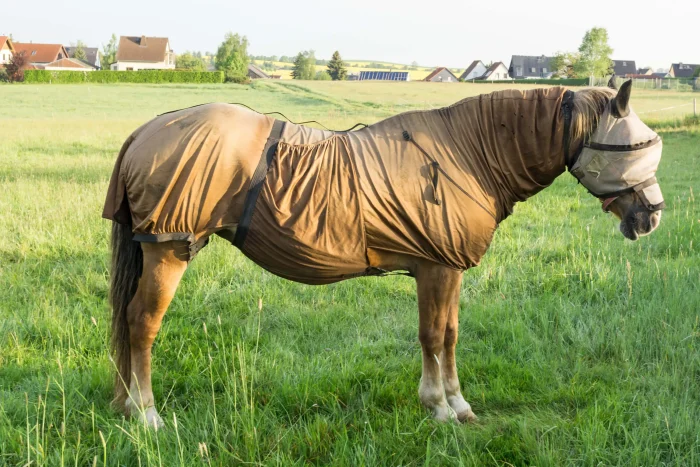We all know that looking after horses in the winter brings an array of challenges. But now those cold, dark wet days are behind us and we are enjoying the brilliant weather with our horses, all will be plain sailing… or will it?
Our team of horse insurance experts at SEIB are ready enjoy the summer months with their horses. What is not to love about summer beach rides, hacking out in the warm evening sunshine and enjoying down-time with an equine spa and bathing day?
There are however several Summer specific ailments that can affect our horses:
Sweet-Itch in horses – is an allergic reaction to bites from midges and mosquitoes that affects some horses and ponies. As the name suggests, horses and ponies that are suffering from sweet-itch will often rub their mane, tail and neck, sometimes resulting in very sore patches. Sweet itch treatments and preventative measures can include fly rugs (or sweet itch rugs), fly repellant sprays and creams and keeping affected horses and ponies stabled at times of the day when the midges are at their worst.

Horse sunburn – It isn’t just humans that can suffer from sunburn. Horses and ponies with pink skin and / or a pink muzzle can get burned if they are left out in the sun. A simple fix is to keep a handy bottle of sun block or high factor sun cream at the yard and apply it liberally when needed. If your horse has pink skin that burns through their coat, using a fly rug made from UV protective fabric can be effective.
A sun-bleached coat – If your horse or pony is out in the day-time in the summer and has a chestnut or bay coat, you may notice the colour of their hair fades. It is the same as the bleaching effect that the sun can have on curtains or photos. Ways to avoid this include turning out overnight instead of during the day, or putting a fly rug on in the field.
Laminitis – Once the lush spring grass has dried up and Summer is well and truly here, it is easy to assume that the risk of laminitis is over. It is always good to be vigilant though as laminitis can still happen. Laminitis is an extremely painful condition affecting the feet of horses, ponies and donkeys. Animals that are overweight, or have previously suffered from laminitis are more susceptible to a recurrence. Read more about laminitis in horses here.
Conjunctivitis – The Summer influx of flies, bugs and midges can also affect horses and ponies’ eyes. When bacteria carrying flies land on horses’ eyes and face, it can lead to conjunctivitis. This can be identified by weeping and swollen eyes sometimes with pink eyelids. Bathing affected eyes with cooled tea-bags – the tannin in the tea helps soothe – can be effective although you may need eye-drops. Using a fly-mask can help prevent conjunctivitis.
As with any concern regarding equine ailments and illness, if you are concerned about your horse, seek veterinary advice immediately. Ensuring you have appropriate and effective insurance for horses gives peace of mind when things don’t go to plan. Our team of horse insurance experts here at SEIB are on hand to help.